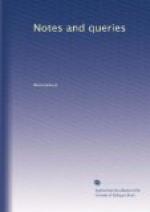“I by accident (from memory only I speak now) recollect one where the Craftsman was acquitted; and I recollect it from a famous, witty, and ingenious ballad that was made at the time by Mr. Pulteney; and though it is a ballad, I will cite the stanza I remember from it, because it will show you the idea of the able men in opposition, and the leaders of the popular party in those days. They had not an idea of assuming that the jury put it upon another and much better ground. The stanza I allude to is this:—
“’For Sir Philip
well knows,
That his innuendos
Will serve him no longer,
In verse or in prose;
For twelve honest men have decided the cause,
Who are judges of fact, though not judges of
laws.’
“It was the admission of the whole of that party; they put it right; they put it upon the meaning of the innuendos; upon that the jury acquitted the defendant; and they never put up a pretence of any other power, except when talking to the jury themselves.”
In Howell’s State Trials (xxi. 1038.) is a note on this passage. This note (stated to be from the Speeches of Hon. Thomas Erskine) is as follows:—
“It appears by a pamphlet
printed in 1754, that Lord Mansfield
is mistaken. The verse
runs thus:—
“’Sir
Philip well knows,
That
his innuendos
Will serve him
no longer in verse or in prose:
For twelve honest
men have determined the cause,
Who are judges
alike of the facts and the laws.’"{148}
Lord Campbell, in his Lives of the Chancellors (v. 25.) and Lives of the Lord Chief Justices (ii. 543.), and Mr. Harris, in his Life of Lord Chancellor Hardwicke (i. 221.), give the lines as quoted by Lord Mansfield, with the exception of the last and only important line, which they give, after the note to Erskine’s speeches, as
“Who are judges alike of the facts and the laws.”
And Lord Campbell (who refers to State Trials, xxi.) says that Lord Mansfield, in the Dean of St. Asaph’s Case, misquoted the lines “to suit his purpose, or from lapse of memory.”
I know not what is the pamphlet referred to as printed in 1754; but on consulting the song itself, as given in the 5th volume of the Craftsman, 337., and there entitled “The Honest Jury; or, Caleb Triumphant. To the tune of ‘Packington’s Pound,’” I find not only that Lord Mansfield’s recollection of the stanza he referred to was substantially correct, but that the opinion in support of which he cited it is expressed in another stanza besides that which he quoted. The first verse of the song is as follows:




